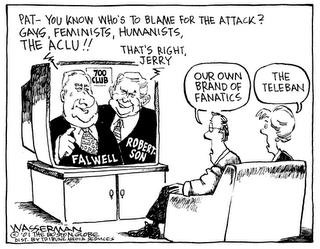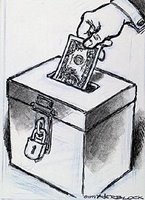By Mehrun EtebariJuly 17, 2003
We’ve all heard the claims that cutting tax rates for the richest Americans will improve the standard of living for the working class. Supposedly, top-bracket tax breaks will result in more jobs being created, higher wages for the average worker, and an overall upturn in our economy. It’s at the heart of the infamous trickle-down theory.
The past 40 years have seen a gradual decrease in the top bracket’s income tax rate, from 91% in 1963 to 35% in 2003. It went as low as 28% in 1988 and 1989 due to legislation passed under Reagan, the trickle-down theory’s most famous adherent. The Clinton years saw the top bracket hold steady at a higher rate of 39.6%, but under the younger Bush’s tax-cut policies, the rich are once again paying less. The drastic change in tax policy that has taken place since the early 1960s gives us a great opportunity to study and evaluate the claims that lower taxes for the rich translate to more wealth for the average American.
We can compare changes in the top tax rate with the real GDP growth rate (a measure of the growth of the entire U.S. economy), and three measures of how life is for the average working American: annual median income growth, annual average hourly wage growth, and job creation. If cuts for the rich were really the magic elixir for the economy and the middle class that the Republican consensus claims it is, we would see an increase in the four indicators whenever the tax rate dropped. However, this is not the case. Such a trend occurs sometimes, but the opposite happens at other times!
Let’s look one by one at comparisons of key economic indicators to the top tax rate.
1. Cutting the top tax rate does not lead to economic growth.
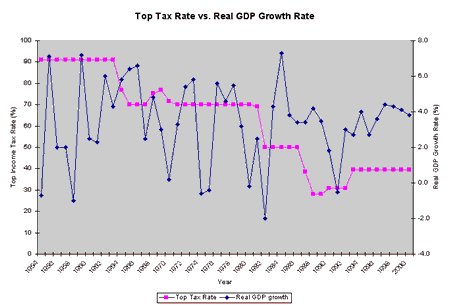
This graph shows the fluctuations of the real GDP growth rate over the period, indicating the performance of the U.S. economy as a whole. It is true that growth increased drastically after the 1982 tax cut, reaching as high as 7.3% in 1984. However, as the Reagan-Bush, Sr. administrations went on and taxes for the rich were slashed even further, growth fell to negative levels during 1991, at the heart of the last recession. And, two of the three years with the highest growth were during the 1950s, when the top tax rate was 91%. Overall, there seems to be no close relationship between the top tax rate and the GDP growth rate, and statistical analysis backs this up: the correlation coefficient between the two variables is 0.03, meaning that there is essentially no connection. (If tax cuts were strongly related to GDP growth, we would see a coefficient close to –1.) So much for upper-class tax cuts boosting the economy; now it’s on to median income growth.
2. Cutting the top tax rate does not lead to income growth.
Again, we see inconclusive evidence for the power of tax cuts. 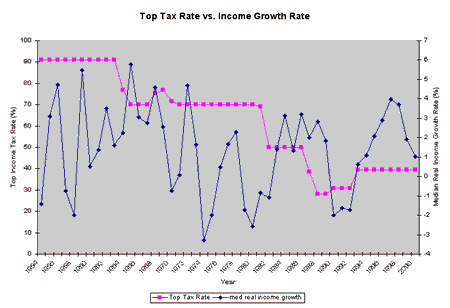 We do see small peaks in median income growth, a good measure of how the average American household is doing, after top-bracket tax cuts in the mid-1960s and early 1980s, but we also actually see income decreases after the tax cuts of the late 1980s, and strong growth after the tax increase of 1993. It is true that in the year with the worst median income decrease (3.3% in 1974), the top tax rate was 70%. However, it was also 70% in the year with the highest median income growth (4.7% in 1972)! Once again, the lack of connection between the two measures is backed up by a correlation coefficient near zero: 0.06, to be exact. And yes, yet again, the coefficient is positive, indicating that income has gone up slightly (though negligibly) more in years with higher taxes. Two strikes. How about hourly wages?
We do see small peaks in median income growth, a good measure of how the average American household is doing, after top-bracket tax cuts in the mid-1960s and early 1980s, but we also actually see income decreases after the tax cuts of the late 1980s, and strong growth after the tax increase of 1993. It is true that in the year with the worst median income decrease (3.3% in 1974), the top tax rate was 70%. However, it was also 70% in the year with the highest median income growth (4.7% in 1972)! Once again, the lack of connection between the two measures is backed up by a correlation coefficient near zero: 0.06, to be exact. And yes, yet again, the coefficient is positive, indicating that income has gone up slightly (though negligibly) more in years with higher taxes. Two strikes. How about hourly wages?
3. Cutting the top tax rate does not lead to wage growth.
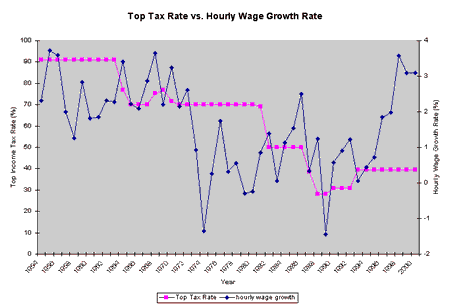
Not surprisingly, we have mixed results yet again! Growth in average hourly wages did increase during the 1980s following the first Reagan tax cuts, albeit two years after the cuts took effect. But, just like GDP growth and median income growth, hourly wages decreased following the late 1980s tax cuts, and spiked upwards after the 1993 tax increase.
Furthermore, wages grew at a level of at least 1%, and usually much more, all throughout the period when the top income tax rate was 91%. In fact, it isn’t until 1972 that we see a wage growth rate of less than 1%. However, if we look at the 19 years of the study period when the top tax rate was 50% or less, we see that 8 of the years saw an increase in wages of less than 1%. Thus, it seems that hourly wages grew more when taxes were higher – indeed, the correlation coefficient is 0.34, indicating a mild positive relationship between higher taxes for the rich and higher hourly wages. This finding flies in the face of the conservative theory. As if that's not enough, now let’s see about what President Bush claimed would be the biggest result of tax cuts – job creation.
4. Cutting the top tax rate does not lead to job creation.
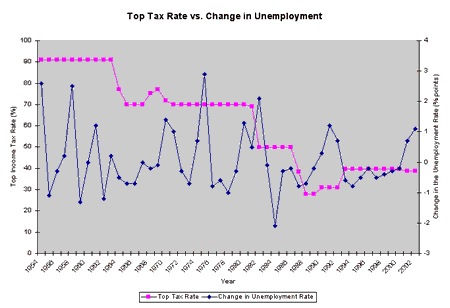
Here, we see the change in the unemployment rate laid against the top tax rate from 1954 to 2002. Thus, negative values signify a decrease in unemployment -- in essence, job creation. Once again, while the top tax rate trends downward over the period, the annual change in unemployment doesn't seem to trend at all! Although the largest increase (2.9%) did occur in 1975, when the top marginal tax rate was 70%, three of the four largest decreases in unemployment occurred in years when the top rate was 91%. The mixed results do not bode well for those who see tax cuts for the richest as a sparkplug to incite job growth. The correlation coefficient between the variables here is 0.11 -- meaning that there have been slightly more jobs created in years with lower top tax rates, but this pattern is negligible -- nowhere near strong enough to signify a relationship.
So, can you tell what our conclusion is yet?
Overall, data from the past 50 years strongly refutes any arguments that cutting taxes for the richest Americans will improve the economic standing of the lower and middle classes or the nation as a whole. To be sure, the economic indicators examined in this report are dependent on a variety of factors, not just tax policy. However, what this study does show is that any attempt to stimulate economic growth by cutting taxes for the rich will do nothing -- it hasn't worked over the past 50 years, so why would it work in the future?
To put it simply and bluntly, Bush's top-bracket tax cut is an ineffective attempt at stimulus that will not cause any growth.
(Source)


